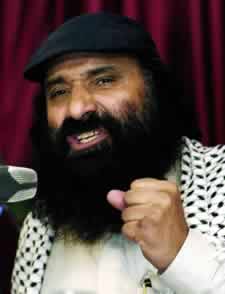 A former top Indian intelligence official has penned his memoirs detailing the exploits of Pakistani diplomats between the sheets. A former top Indian intelligence official has penned his memoirs detailing the exploits of Pakistani diplomats between the sheets.
| "Shaujaat. Chaudry Shaujaat..." |
'Open secrets India's intelligence unveiled' by Maloy Krishna Dhar, former joint director of the Intelligence Bureau (IB), details the intelligence games between Pakistani and Indian agents since 1956, including the "honey traps" used by both sides to gain information. The book contains several sensational claims about current Indian politicians that are causing a stir here.
| "You doinked that hussy at the SAARC summit! Patel, how could you!" |
Dhar writes how, as head of the Pakistan desk at the counter-intelligence wing of the IB, he tailed and video-taped several Delhi-based Pakistani diplomats in bed with various women. One diplomat had seduced the sister of a reputed journalist who was close to then prime minister Rajiv Gandhi.
"She had succumbed to the blackmailing of a Pakistani diplomat of NWFP origin. The Pakistan Counter Intelligence Unit documented several of their intimate meetings with appropriate light and sound. The tape was played for the prime minister and he took action..." writes Dhar in his book, an advance copy of which was made available to Daily Times.
"Tell, me, madame, what are we to make of these pictures?"
"That is not my butt!"
"The lighting is very good. And the sound is superb. Are you sure this is not your butt?" |
Another Pakistani diplomat had seduced the daughter-in-law of a reputed arms peddler and defence contractor. "She had arranged two meetings of the Pakistani diplomat with a serving major general of the Indian Army," Dhar writes.
| "Uncle Mukkerjee, this is my lover, Shaujaat. Shaujaat, this is Uncle Mukkerjee, the very model of a modern major general..." |
Indian agencies also used "honey traps" to target Pakistani diplomats based in New Delhi. One Pakistani diplomat had pierced deep into Indian defence targets and was a great headache for Indian agencies. "His behavioural peculiarities were studied over a period and it was found he was fond of a certain lady from old Delhi. The beauty was recruited and taught certain trade secrets. A trap was laid and the diplomat was caught fabulously on celluloid," writes Dhar. He adds that the woman was later used in operations inside the high security Pakistani High Commission.
"What kind of operations?"
"Sensitive operations!" |
In a claim that tears apart the stand of Hindu nationalists (Sangh Parivar) and the government, the book says that the demolition of Babri Masjid was planned 10 months in advance by top leaders of the RSS, BJP and VHP. "Around February 1992, soon after the flop 'ekta yatra' of Murli Manohar Joshi, I was directed to arrange technical coverage of a key meeting of the BJP/Sangh Parivar. The meeting was to be attended by Lal Krishna Advani, MM Joshi, Rajju Bhaiya (then RSS chief), KS Sudarshan, Vijayaraje Scindia, HS Sheshadri, Vinay Katiyar, Uma Bharati and Champat Rai," the author says.
| "Along with three dozen hookers from Peshawar and Quetta, of course." |
About operations in Kashmir, Dhar says Indian democracy "has never given a sincere try to the goodwill of the people of Kashmir". He writes that India's Kashmir policy has remained hostage to the interests of the Nehru-Gandhi and Sheikh Abdullah families, together with certain peripheral Kashmiri Muslims and core Pandits (Kashmiri Hindus) and a few intelligence bureaucrats. He says that around 1989, intelligence production in that state had dried up. When called to assist, Dhar writes, he raised some intelligence assets in the valley. "I deftly used the services of a Delhi-based Muslim lady to recruit a couple of Kashmiri Muslim assets. These assets were engaged in fruit and carpet trading and lived around Muslims ghettos in the Lajpat Nagar and Okhla localities of Delhi," he writes.
"I can't seduce him!"
"Oh, c'mon! Why not?"
"He smells like old bananas!"
"Well, try the carpet guy, then." |
|
 (KUNA) -- The Government of India will take every possible step to prevent terror attacks in the future, said Indian Prime Minister Dr. Manmohan Singh while on a visit to the country's financial capital Mumbai, which faced serial kabooms Wednesday evening claiming 17 lives and injuring around 130 more.
(KUNA) -- The Government of India will take every possible step to prevent terror attacks in the future, said Indian Prime Minister Dr. Manmohan Singh while on a visit to the country's financial capital Mumbai, which faced serial kabooms Wednesday evening claiming 17 lives and injuring around 130 more.

 Indian Opposition leader and former deputy prime minister
Indian Opposition leader and former deputy prime minister  India's beleaguered main opposition
India's beleaguered main opposition  A former top Indian intelligence official has penned his memoirs detailing the exploits of Pakistani diplomats between the sheets.
A former top Indian intelligence official has penned his memoirs detailing the exploits of Pakistani diplomats between the sheets.